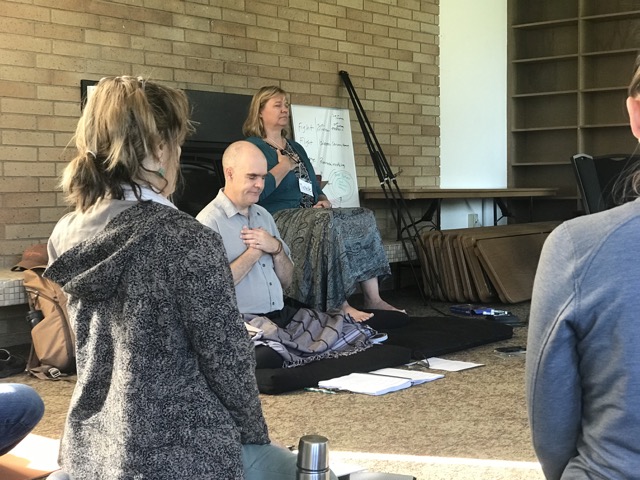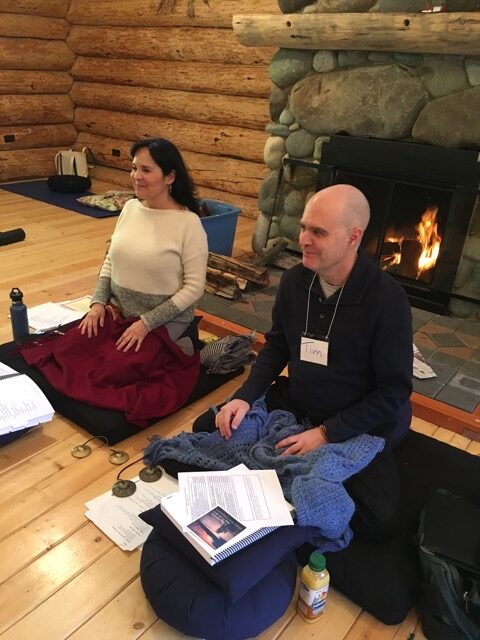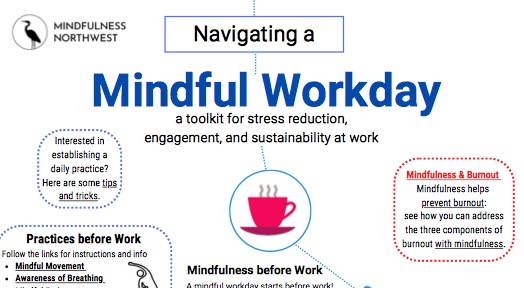Programs
Frequently Asked Questions about our programs
Who takes your classes?
All adults (18+) are welcome! Our supportive, inclusive community celebrates participants from all backgrounds. Certain retreats are best suited for more experienced practitioners; details about prerequisites are included with each event description.
We ask that people who are attending our programs together please register separately.
What are our classes like?
IMPORTANT INFO ABOUT OUR 8-WEEK COURSES
Our teachers work hard to create a supportive, friendly, and safe classroom community for you and the other participants in our 8-week classes. Mindfulness and compassion training can be many things to many people at different points in their lives: supportive, exploratory, revealing, and at times challenging. The classes include both tools you can use every day and opportunities to take a deep dive into your mind, habits, and conditioning. This process has many benefits but it’s also important to consider if the time is right. Please read on and consider watching the 5-minute video below.
There are instances where a longer course like Mindfulness-Based Stress Reduction or Mindful Self-Compassion can be less helpful or even harmful.If you’ve recently experienced serious psychological challenges like schizophrenia or psychosis not responsive to medication, or you are experiencing severe depression with thoughts of suicide, class is probably not helpful at this time. We also suggest caution if you’re recently in recovery, recently lost a close loved one, have Post-Traumatic Stress Disorder (PTSD), or have recently experienced significant trauma.
If you’re unsure about registering for a course, please contact the Mindfulness Northwest office. We want to be sure there is sufficient support for you and that the timing is right for taking our courses.
We hope you enjoy this five-minute message from Executive Director Tim Burnett on what our classes look and feel like. We recommend you watch it before enrolling in an 8-week or residential MBSR or MSC.
Is there a way to make up a missed class?
Yes! We allow participants in MBSR, MSC, and MHP courses to attend another class in the same quarter (when possible). You may email us at office@mindfulnessnorthwest.com to make arrangements. Provide the name of your current class, location, day of the week, and the class you’ll be missing (e.g. MBSR, Online, Tuesday nights, class 6). You’ll be contacted by the Community Program Coordinator within one business day.
Discounts and Scholarships
Mindfulness Northwest offers discounts and scholarships. Our mission is to make mindfulness accessible.
For all of our programs, we offer a sliding scale for tuition which includes scholarship rates.
No need to apply; simply choose the level that's the best fit for your budget. MNW alumni receive a discounted rate for some events. We also provide a 4-month interest-free payment plan option, available during registration.
About Our Multi-Day Silent Retreats

WHO COMES TO RETREATS?
All are welcome! We are honored to support each participant in their meditation practice regardless of their nationality, ethnicity, race, color, gender, gender identity, sexual identity, age, physical ability, political affiliation, or religion. Our retreats are suitable for beginning through experienced practitioners.
We are committed to offering support for any accessibility needs you have as we are able. Please contact us prior to registering for a course.
YOUR FIRST LONGER RETREAT?
Before sitting a multi-day retreat we recommend that you have teacher-led experience with mindfulness or related contemplative practices. Please contact us if you have questions about whether this retreat will be appropriate for you.
IS RETREAT RIGHT FOR YOU? Meditation retreats are not right for everyone. If you have a history of trauma or acute psychological issues, consider checking with a mental health professional to decide if intensive retreat practice would be supportive. If you have questions or concerns about whether a retreat is right for you, please contact us at office@mindfulnessnorthwest.com.
STRUCTURE AND PARTICIPATION
FOUR DAILY PRACTICE SESSIONS
- Mindfulness and compassion practices are offered in four blocks daily: early morning, morning, afternoon, and evening.
- Participants are expected to attend all sessions and follow the printed schedule you will receive on site as fully as possible.
However, we are flexible and always willing to work with you on what your body and mind can reasonably do. Speak with the retreat teachers if you have concerns about following the complete schedule.
PRACTICING IN SILENCE
- After the initial orientation and introductions on the first evening, our residential retreats are held in silence.
- Participants are expected to follow guidelines around silence and participation:
- not speaking to other participants including close friends or partners you are attending with
- not using technology of any form
- not reading books, magazines, flyers, or any reading materials
- reducing interpersonal contact through the eyes or other body language
- Necessary communication with the retreat teachers can be done via a notes station or by taking them aside.
The intention of silent retreat is to settle deeply into your own experience and to not interact with others, allowing everyone space to have the retreat they need to have -- including you!
PERSONAL AND INTERPERSONAL SAFETY
Participants are expected to be sensitive and responsive to these guidelines and the needs of fellow participants as fully as possible.
- Do not take photos or make recordings of other participants or the teachers.
- Do not use alcohol or mind altering drugs of any kind.
- Emergency contact information to share with loved ones will be sent to you. Venue staff and Mindfulness Northwest instructors will make sure you receive incoming messages promptly while your phone is off. If you are expecting an urgent message please let your instructor know.
- Instructors are available at all times to offer support, including conversation if needed.
OTHER GUIDELINES
 ATTEND THE ENTIRE RETREAT
ATTEND THE ENTIRE RETREAT
Please arrive at the retreat at the beginning and stay until the end, as:
- Arriving late will cause stress as you will miss the orientation.
- Leaving early means you are offloading your clean-up chores on other participants and missing an opportunity for closure.
- Please stay on campus unless invited to take an off-campus break by the instructors.
RETREAT CENTER CHORES
- Several of our venues keep costs down, reducing your registration fee, by asking that event participants wash dishes, sweep floors, clean bathrooms, and do other chores around the facility. Final clean up chores before leaving are also done.
- Participants are asked to do chores as fully as they are able. If you have physical limitations, we will help you find a suitable chore assignment.
WHAT TO BRING
- Face masks – please check our COVID policy for our current guidelines around masking. While masks may not be required at your training, it's always a good idea to bring some.
- Extra COVID tests, in case you develop symptoms during the retreat.
- Warm clothes in layers (sweater, jacket, raingear etc) Outdoor walking meditation will be a component of this retreat, rain or shine.
- Shoes that are (1) fine walking in damp grass and (2) slip-on if possible. We take shoes on and off frequently. Slippers for the practice room can also be nice to have.
- Toiletries and overnight things including a towel.
- Bringing your own bedding (pillows, sheets, blankets or sleeping bag) is required at most of our venues. Please check your registration confirmation email for this information.
- A flashlight can be helpful but venues are generally reasonably well lit. Sometimes there is walking between buildings in the early morning and evening.
- A yoga mat if you have a favorite. We are able to bring mats to share.
- Meditation cushions / supplies – if you have a meditation cushion(s), a bench or other sitting gear, feel free to bring it. We are able to bring a limited supply of cushions. Note that there are plenty of chairs available.
- An extra blanket or two for the meditation hall – nice for body scans and resting.
LODGING
Lodging assignments will be available on check-in at the course venue. You will have a room to yourself at most of our venues.
AFTER THE RETREAT
Silent mindfulness retreats can be psychologically powerful. It's not unusual to experience significant shifts in your mood and energy levels right after a retreat. We recommend that you closely monitor your "mental hygiene" by avoiding over stimulating environments or influences directly after the retreat (i.e. parties, loud events, violent content, harsh substances or emotionally straining company). You can support the integration of your retreat experience with activities like journaling/drawing, mindful movement, spending time in nature or even a shower/soak in a bath. If you feel "off" several days after your retreat we encourage you to seek out support. Don't hesitate to reach out to us at office@mindfulnessnorthwest.com to connect with one of our teachers.
About Our Online Silent Retreats
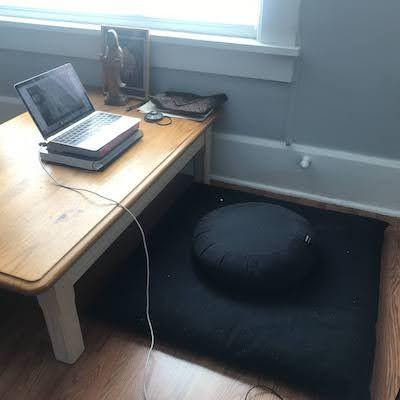
Below are a few suggestions to help you create an optimal retreat experience, realizing each of you has a unique home situation.
PREPARING FOR YOUR RETREAT AT HOME
- A quiet space - As much as possible, create a separate, quiet space away from family and distraction, even pets if they might distract you or other participants.
- Unplug - Plan to “unplug” from your phone, clocks, or any other electronic device unless using it to connect to our virtual retreat room. Turn off any notifications that might pop up on the device you're using to connect to the retreat.
- Free yourself up - Minimize or eliminate as many tasks and activities as you can. Normally we would be in a retreat setting to allow for an immersive experience. Retreating at home offers the benefit of being able to practice mindfulness skills in your regular environment while it offers the potential challenge of home distractions.
- Have a conversation ahead - We suggest that you prepare your household members ahead, letting them know you’ll be practicing silence during this time. If you're able to, maintaining silence or minimizing talk between practice periods (like we do at our in-person retreats) is a valuable contribution to the retreat experience.
- Explore integration and accept what happens - See an online retreat as an opportunity to integrate mindfulness practice and your daily life instead of as a way to “get away” – it helps to see this as a different type of experience from an in-person retreat at a retreat center.
- It won't be perfect - Resistance and wanting things to be other than they are can be a part of all contemplative practices. Please accept that the day will unfold in the way that it does and much is beyond your control. If things are busier or in some way not to your liking in the environment as you do the series of practices offered, please accept things as they are and know that there is benefit.
WE ASK THAT YOU:
- Sign in a little early to make sure you can connect.
- Turn cameras on once the retreat starts. This is not a requirement, but we've found that having cameras on best supports a rich and connected experience for all participants.
- Stay muted unless we are having a discussion.
- Maintain silence and focus as possible during practice times: refraining from speaking, reading, writing, or using other devices.
Following the guidelines supports a deep dive into practice for you and the entire community. Thank you.
About Our Residential Trainings
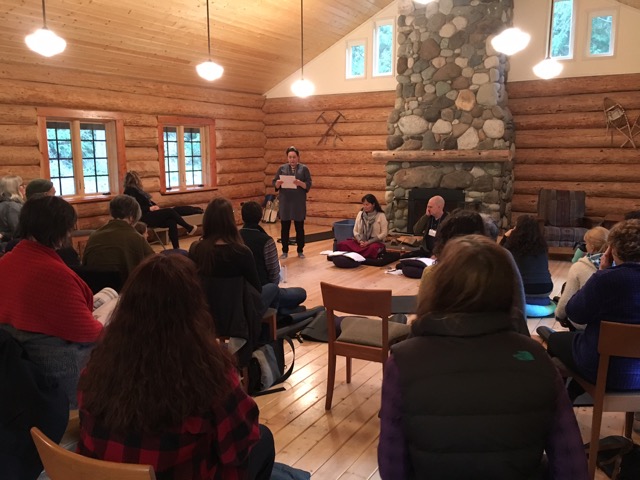
Residential Trainings are excellent if you cannot attend our 8-week classes or simply prefer the more intensive format and appreciate the way a Residential Training gets you away from your daily routine with space to focus.
We also offer silent teacher-led Residential Retreats. These are meditation retreats which consist primarily of silent meditation practice with some spoken guidance and brief talks from the teachers. Please see our Residential Silent Retreats section for more information.
STRUCTURE AND PARTICIPATION
A TRAINING DAY
Early morning practice starts our days before breakfast. Then 3-hour classroom sessions are offered morning and afternoon of most days. Evening sessions with additional resources and opportunities are offered on a few evenings as well. Participants are expected to attend all classroom sessions, but evening sessions are usually optional. You'll receive a printed schedule and guidance from the teachers about navigating these rich days of practice, study, and learning.
PERIODS OF SILENCE
Although our Residential Courses are interactive with talking, there are some periods of silence. Early morning and breakfast are usually held in silence, for example. Participants are expected to follow guidelines around silence and participation.
INTERPERSONAL SAFETY
Mindfulness and compassion training programs involve our personal stories and emotions. Instructors will work with the group to establish clear guidelines for safety. Participants are expected to be sensitive and responsive to these guidelines and the needs of fellow participants as fully as possible.
VENUE CHORES
To keep costs down, several of our venues ask that event participants wash dishes, sweep floors, clean bathrooms, and do other chores around the facility. We also do final clean up chores before leaving. We ask you to do chores as fully as you are able. If you have physical limitations we will help you find a suitable chore assignment.
REQUESTS OF YOU
- Arrive for the very beginning and stay to the end of the program.
- Follow the course schedule.
- Honor times of silence noted on the schedule: no reading, writing, or using devices during these times of silence.
- Please stay on campus unless invited to take an off-campus break by the instructors.
- Please do not use recreational drugs or intoxicants during any part of the training.
- Participants are asked to focus their energies and attention on the instruction and curriculum in order to get the most benefit from the week of training and in consideration of all participants.
- Do not take photos, video, or recordings of other participants or the instructors without their prior permission.
WHAT TO BRING
- Face masks – please check our COVID policy for our current guidelines around masking. While masks may not be required at your training, it's always a good idea to bring some.
- Warm clothes in layers (sweater, and jacket, etc) as we will be going in and out of doors as we move between buildings.
- Rain coat AND umbrella. This is the Pacific Northwest.
- Shoes that are (1) fine walking in damp grass and (2) slip-on if possible. We take shoes on and off frequently. Slippers for the practice room can also be nice to have.
- Toiletries and overnight things including a towel.
- Bringing your own bedding (pillows, sheets, blankets or sleeping bag) is required at most of our venues. Please check your registration confirmation email for this information.
- A flashlight can be helpful but venues are generally reasonably well lit. Sometimes there is walking between buildings in the early morning and evening.
- A yoga mat if you have a favorite. We are able to bring mats to share.
- Meditation cushions / supplies – if you have a meditation cushion(s), a bench or other sitting gear feel free to bring it. We are able to bring a limited supply of cushions. Note that there are plenty of chairs available.
- An extra blanket or two for the meditation hall – nice for body scans and resting.
- A notebook and pens like you would to any class or seminar.
WHAT’S NOT NEEDED
- Minimize electronic gadgets beyond what you need to take notes. We encourage you to consider reducing or disconnecting from phone, email, and text contact, but this is not required like it is in our silent residential retreats.
LODGING
Lodging assignments will be available on check-in at the course venue. You will have a room to yourself at most of our venues.
DIVERSITY & ACCESSIBILITY
We are honored to support each participant in their training regardless of their nationality, ethnicity, race, color, gender, gender identity, sexual identity, age, physical ability, political affiliation, or religion.
We are committed to offering support for any accessibility needs you have as we are able. Please contact us with any questions or requests related to accessibility prior to registering for a course.
AUDIO/VIDEO RECORDING TAKEN BY MINDFULNESS NORTHWEST
Audio/video recordings of our instructors may occasionally be created for certification and training purposes during these programs. These recordings will include only our instructors in the photo frame (though they may pick up student voices at some points in the recording) and are for internal use only.
We may also request your consent to take photos or videos for promotional purposes. Your image will not be captured or used without your consent.

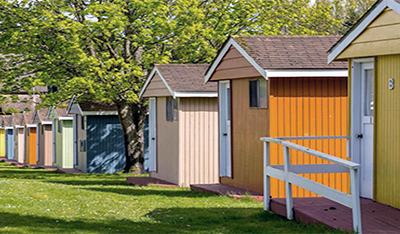
 ATTEND THE ENTIRE RETREAT
ATTEND THE ENTIRE RETREAT